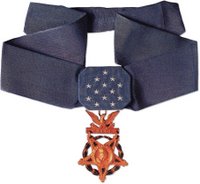Paul Joseph Wiedorfer
17 Jan 1921 - 25 May 2011
17 Jan 1921 - 25 May 2011
ZUI this article from the Washington Post:
Paul J. Wiedorfer, 89, who as an Army private on Christmas Day 1944 charged two German machine-gun nests and single-handedly saved his platoon mates caught in an ambush, an act for which he received the Medal of Honor, died May 25 at the Baltimore VA Medical Center. His family said he had congestive heart failure.
Mr. Wiedorfer, who was born and grew up in Baltimore, was reportedly Maryland’s last surviving recipient of the Medal of Honor, the military’s highest award for valor.
He was 23 when his unit, part of Gen. George S. Patton’s Third Army, was sent to rescue American troops trapped in Bastogne, Belgium, during the first days of the Battle of the Bulge.
*******
“I was probably a little nuts when I did it,” he told the Baltimore Sun in 1995. “But someone was going to die if something didn’t get done.”
*******
Two months later, crossing the Saar River in Germany, Mr. Wiedorfer’s unit came under mortar fire. The soldier next to him was killed instantly. Mr. Wiedorfer was struck by shrapnel, and the blast shattered his leg and injured his hand. He recuperated at a hospital in England, where he was placed in traction.
One day, a fellow patient was reading the Stars and Stripes newspaper and informed Mr. Wiedorfer that he’d just received the Medal of Honor for his Christmas Day bravery.
*******
Mr. Wiedorfer’s wife, the former Alice Stauffer, died in 2008. A daughter, Nancy Mazer, died in 2010.
Survivors include three children, Randee Wiedorfer of Parkville, Md., Paul J. Wiedorfer Jr. of Baltimore and Gary Wiedorfer of Cocoa, Fla.; six grandchildren; and three great-grandchildren.
ZUI also this article (dated 11 May 2008) from the Baltimore Sun.
There are now 84 living Medal of Honor recipients.
************* *** *************
PAUL JOSEPH WIEDORFER
Private, US Army; Company G, 318th Infantry, 80th Infantry Division
Born: 17 January 1921, Baltimore, Maryland
Died: 25 May 2011, Baltimore, Maryland
 Citation: He alone made it possible for his company to advance until its objective was seized. Company G had cleared a wooded area [near Chaumont, Belgium,] of snipers, and [on 25 December 1944] 1 platoon was advancing across an open clearing toward another wood when it was met by heavy machinegun fire from 2 German positions dug in at the edge of the second wood. These positions were flanked by enemy riflemen. The platoon took cover behind a small ridge approximately 40 yards from the enemy position. There was no other available protection and the entire platoon was pinned down by the German fire. It was about noon and the day was clear, but the terrain extremely difficult due to a 3-inch snowfall the night before over ice-covered ground. Pvt. Wiedorfer, realizing that the platoon advance could not continue until the 2 enemy machinegun nests were destroyed, voluntarily charged alone across the slippery open ground with no protecting cover of any kind. Running in a crouched position, under a hail of enemy fire, he slipped and fell in the snow, but quickly rose and continued forward with the enemy concentrating automatic and small-arms fire on him as he advanced. Miraculously escaping injury, Pvt. Wiedorfer reached a point some 10 yards from the first machinegun emplacement and hurled a handgrenade into it. With his rifle he killed the remaining Germans, and, without hesitation, wheeled to the right and attacked the second emplacement. One of the enemy was wounded by his fire and the other 6 immediately surrendered. This heroic action by 1 man enabled the platoon to advance from behind its protecting ridge and continue successfully to reach its objective. A few minutes later, when both the platoon leader and the platoon sergeant were wounded, Pvt. Wiedorfer assumed command of the platoon, leading it forward with inspired energy until the mission was accomplished.
Citation: He alone made it possible for his company to advance until its objective was seized. Company G had cleared a wooded area [near Chaumont, Belgium,] of snipers, and [on 25 December 1944] 1 platoon was advancing across an open clearing toward another wood when it was met by heavy machinegun fire from 2 German positions dug in at the edge of the second wood. These positions were flanked by enemy riflemen. The platoon took cover behind a small ridge approximately 40 yards from the enemy position. There was no other available protection and the entire platoon was pinned down by the German fire. It was about noon and the day was clear, but the terrain extremely difficult due to a 3-inch snowfall the night before over ice-covered ground. Pvt. Wiedorfer, realizing that the platoon advance could not continue until the 2 enemy machinegun nests were destroyed, voluntarily charged alone across the slippery open ground with no protecting cover of any kind. Running in a crouched position, under a hail of enemy fire, he slipped and fell in the snow, but quickly rose and continued forward with the enemy concentrating automatic and small-arms fire on him as he advanced. Miraculously escaping injury, Pvt. Wiedorfer reached a point some 10 yards from the first machinegun emplacement and hurled a handgrenade into it. With his rifle he killed the remaining Germans, and, without hesitation, wheeled to the right and attacked the second emplacement. One of the enemy was wounded by his fire and the other 6 immediately surrendered. This heroic action by 1 man enabled the platoon to advance from behind its protecting ridge and continue successfully to reach its objective. A few minutes later, when both the platoon leader and the platoon sergeant were wounded, Pvt. Wiedorfer assumed command of the platoon, leading it forward with inspired energy until the mission was accomplished.











No comments:
Post a Comment